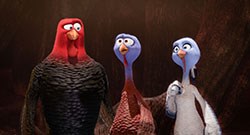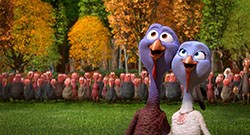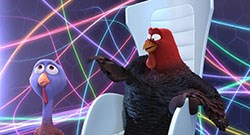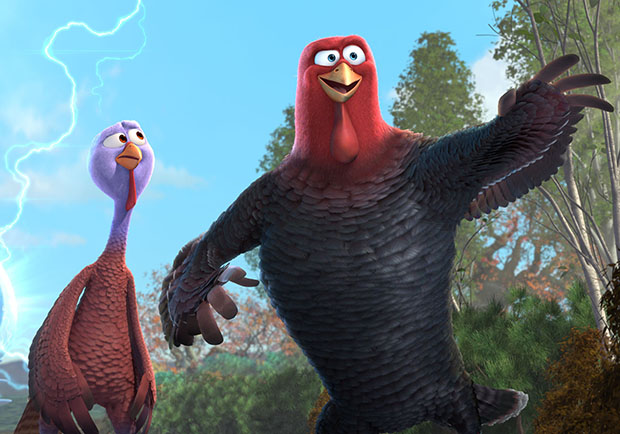Kids' movies, as a genre, are the deepest indicator of what we think is acceptable. They are required to be both totally thematically overt (so that kids don't miss the message) and non-controversial (so that parents will like them).
So if you want a good example of what any one director thinks, go watch a Mature Grownup Movie and notice its philosophical assumptions—its worldview. But if you want to see what messages we as a society think are so true that even kids can watch them and not be harmed, go see a kids' movie. Some people think of it as a product of reduction, that kid's movies can't be agenda-laden "message movies" because they have to be so simple; I think it's more that they distill messages into their simplest forms.
Free Birds starts from some overt, maybe troublesome (for parents, anyway) philosophical assumptions, particularly about faith and religion. And what's fascinating about Free Birds is that it is both a seeming critique of religion cribbed straight from existentialism, and at the same time a deeply American movie. It's an unusual combination, and a potentially worrying one to see in a children's movie.

Free Birds tells the story of Reggie (Owen Wilson), a turkey at a free-range turkey farm somewhere in the unidentified but corn-opulent midwest. He stands out from his fellow turkeys in that he is smart, whereas they are very not.
Reggie's the only turkey who realizes they're being fattened up for the Thanksgiving slaughter, but when he tries to warn his clan, they turn on him and "sacrifice him" to the farmers—who turn out to be the family visited by the President of the United States, selecting a turkey to pardon. Reggie is pardoned and brought back to live with the president, until a commando-like turkey named Jake (Woody Harrelson) abducts him. Jake hopes to take Reggie back into the past to the first Thanksgiving and prevent turkey from becoming the primary ingredient of a delicious Thanksgiving.
You can already see the weird religious parallels starting to emerge: the stupid and ignorant turkeys at Reggie's home, as they're being carried off to be decapitated by the farmer, imagine that they're going to "Turkey Paradise," and celebrate the farmers as being kind and all-powerful rulers. Reggie's flock is exclusive and stupid and collectivist and refuses to listen to the "reason" of people better than them, and, it is strongly implied, represent your average Midwestern Americans.
The Indian turkeys of 1621, in contrast, don't have any notable religious beliefs. But they look at death with an almost eastern mysticism-like transience. The death of an elder is commemorated by a circular air current of feathers that rises up out of their roost and blows away in the wind, here one day and gone the next. In most respects, the Indian turkeys are smarter and happier than modern-day American turkeys, and so it's hard to see that point as anything but an endorsement of at least a-religious sentiment.
I know how I sound when I type the sentence—"The Indian turkeys are happier than the U.S. turkeys so clearly the movie thinks religion is bad." I know it sounds like a classic over-reading of the text, reading anti-Christian rhetoric into a movie that's totally benign just so that you (as reader) and I (as writer) will have something to get angry about.
But I think this next point totally illuminates the movie's ideological slant. To explain it, though, I need to talk about the end of the movie, so, you know—be warned.
(Spoilers ahead.)

The only reason Jake knew to abduct Reggie was because, when Jake was a little poult, a giant egg-shaped orb descended from the sky. Jake was visited by The Great Turkey, who gave him a "Doorknob of Time" and told him to go find Reggie. Jake constantly refers to this visitation throughout the movie, citing it as the primary reason for everything he's done in life, as well as the only thing that helped him overcome past trauma.
This flashback's imagery plays heavily on the image of Paul's visitation on the road to Damascus. World-wise Reggie spends the whole movie asserting that The Great Turkey isn't real, that he's an imaginary friend, that he's someone Jake made up to feel good about himself.
So lo and behold, by the climax of the movie, Reggie realizes that Jake needs to be inspired in the past, and, in the future, finds himself in possession of the "Doorknob of Time," having ripped it from a door. That's when he realizes it: the entire time, what Jake thought had been The Great Turkey was only Reggie, cool and dispassionate as always, realizing that Jake needed something to believe in if he was going to succeed.
So Reggie travels back in time to when Jake was a kid and basically lies, instilling in Jake a sense of otherworldliness and importance and a "mission," just because it was what would make Jake the happiest. (Thus completing the time loop, though the mechanics of time travel are vague and ill-defined and supremely pragmatic, from a storytelling standpoint.)
This idea should be ringing several thematic bells, and prominently, Ricky Gervais's 2009 film The Invention of Lying. In the film, Gervais, the only man in the world capable of telling a lie, invents the notion of Heaven, God, the afterlife, all of it, just for the sake of his mother, who is dying and is afraid of what happens after you die. Belief is, at its core, something the unenlightened need to make it through the day. It's reminiscent of Marx; "religion is the opiate of the masses" is not only meant to say that religion is a lie, but that it is all that keeps people living, all that prevents them from being immersed in the pain of living a terrible life. In this sense, religion is a falsehood told out of compassion.
This strain of existentialism can be called "compassionate atheism," as opposed to the vehement anti-religious fundamentalism of Richard Dawkins types and teenagers on the internet. It's this belief that religion isn't the enemy, and doesn't need to be eradicated, but that in most cases it's just a tool weaker people use because they can't handle the truth.
This is a very American sense of religion, which is to say, a pragmatist view of religion; America's 20th century was defined by the use of religion as a tool for civic unity, rather than as an end unto itself. Religion was good insofar as it promoted equality, and friendship, and Truth, Justice, and The American Way. It was bad when it promoted homophobia, violence, racism, and dissent. That's the religion inherited by the screenwriters of this generation, and it's the religion presented in Free Birds.

Free Birds implies that the fact that we desire transcendent meaning is a good enough reason to invent meaning, and so satisfy that desire. It says that it doesn't matter if the belief is untrue, because the results of it are hope and goodwill and a feeling of purpose for people who are too ignorant to realize that all purpose is self-made, that there is nothing transcendent.
And that's at minimum a weird message for kids to hear, especially kids born into a generation convinced that the only meaning to be had in the world is what you make for yourself. This isn't some minor facet of the movie, enlarged for critique; if you throw out every dumb joke, every reference, every distracting visual effect and minor plot device, what you're left with is a tale of Reggie-as-William James, completely making up a story for a young, impressionable Jake to believe, and that's good—because it works.
It's telling that a kid's movie that nominally celebrates what may be the foundational American holiday, Thanksgiving, actually ends up being a love letter to the most purely-American philosophy ever invented: pragmatism, which says, "nothing means anything, objectively. Whatever meaning is, you'll only find it by making it yourself. And you'll know when it's real, because it'll work." What's more American than that?
Caveat Spectator
Birds call each other names, and get into fights—but the fights look more like a dance than anything else. One turkey dies off-screen; a human faints and is said to have died. One poultry kiss takes place just off-screen.
Jackson Cuidon is a writer in New York City. You can follow him on his semi-annually updated Twitter account: @jxscott









